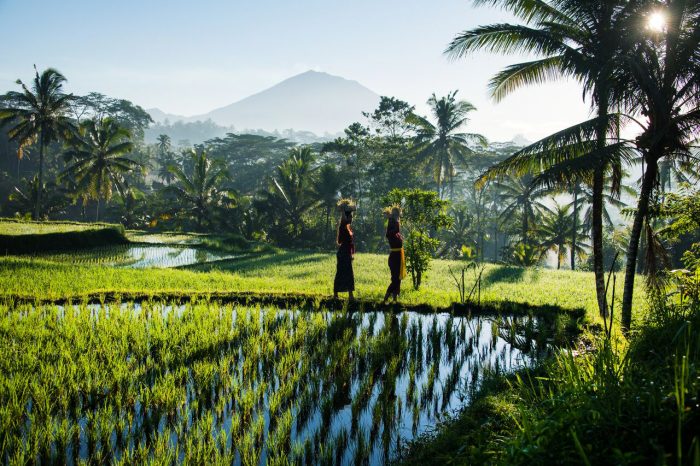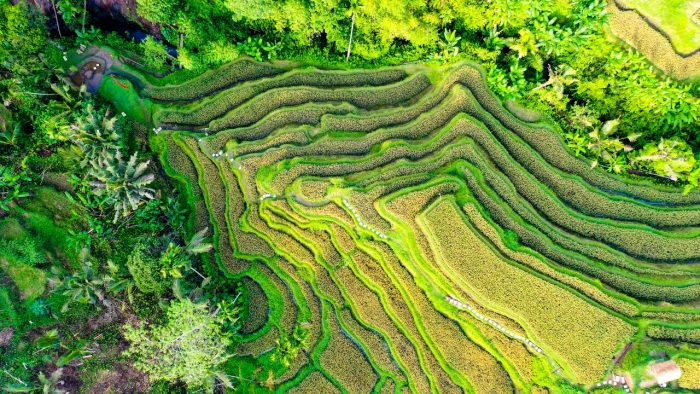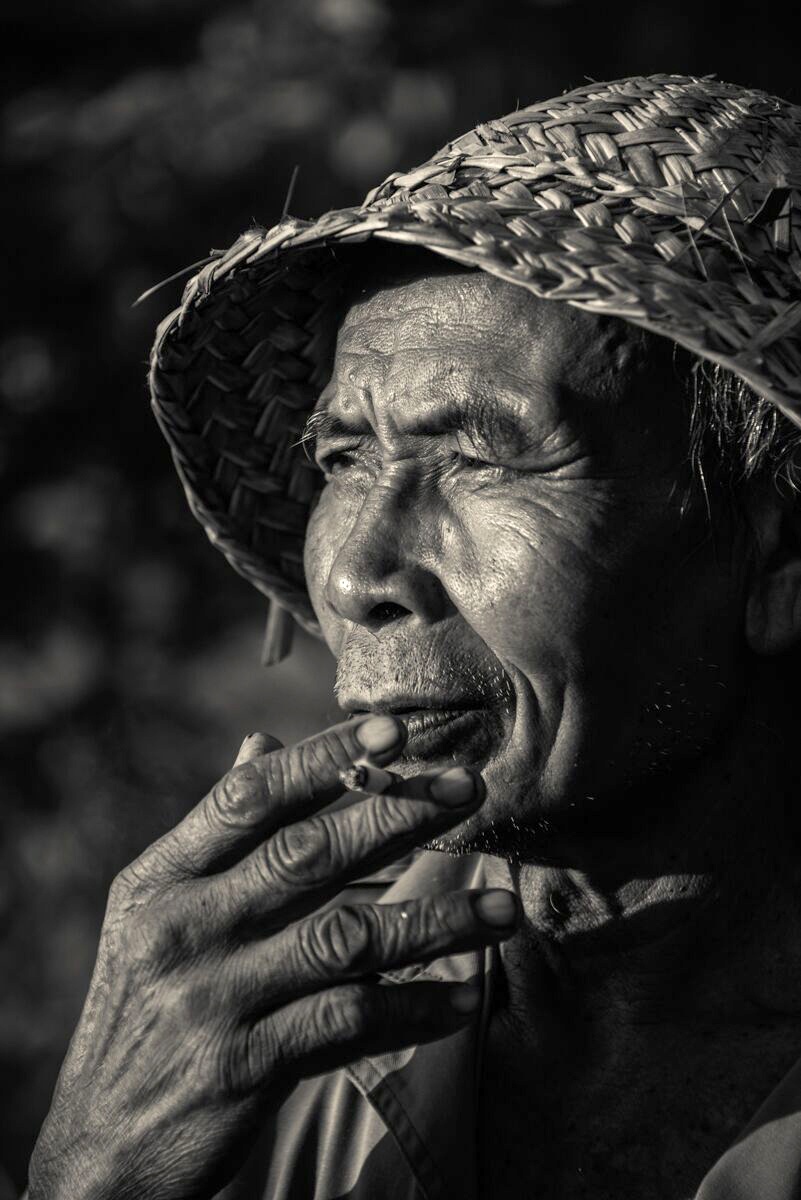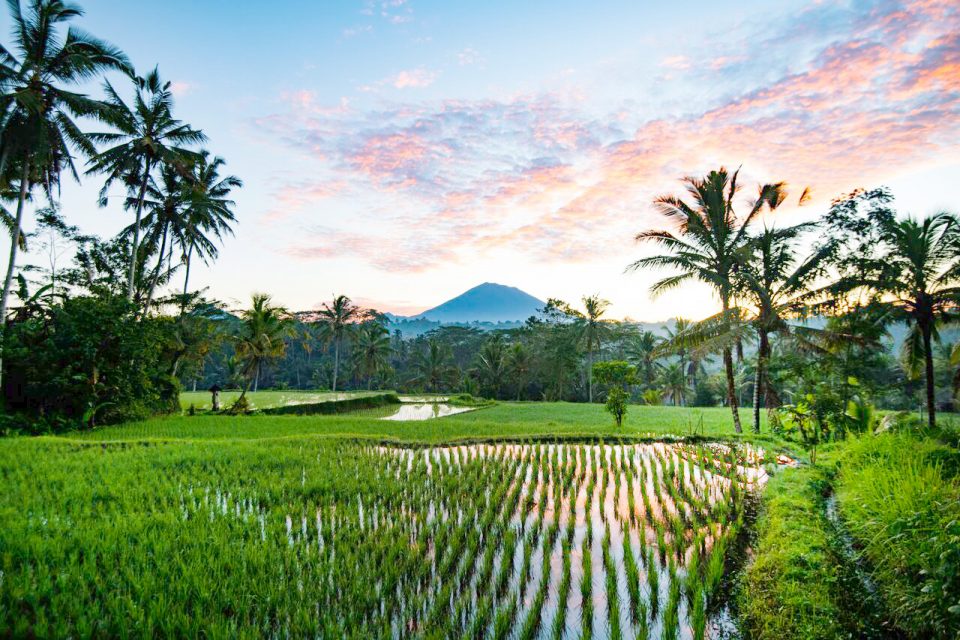The humble rice field is a gateway to Balinese culture and spirituality.
Since the 9th century, a sophisticated system of irrigation channels or “subak” has distributed water across the island. In 2012, UNESCO gave the well-deserved world heritage status to this Balinese subak system.
Every day on my walk in Taro village, I had seen an old man toiling tirelessly in the hot sun, seemingly unaware of the busy road adjoining his rice field. I was surprised, then, at his wide smile when I interrupted his work to introduce myself. He warmly invited me to sit on a ledge adjoining his rice field, and spoke to me, “We respect the water, and for four generations my family have been farming on this land. Our water comes from the subak system. We have village meetings with the priests and our banjar (village council) heads and work together to make sure things run smoothly.”
I was surprised to learn from him that every Balinese village is part of a subak and that it is mandatory to join the organisation if you are a rice farmer. So many times, I have passed by long concrete canals in Bali and even spotted the occasional dyke but, until Kadek explained it to me, I did not understand how the whole system is linked, drawing water from the mountains and large lakes in the interior of the island. These canals are part of a complex system channelling the water through dams, tunnels and pipes to allow for flooding or draining of rice fields precisely when needed. The cultural landscape of Bali would, indeed, look very different if this system was not in place.
Kadek told me that the Balinese philosophy called “Tri Hita Karana” is closely linked to the subak with the water temples at their centre. “Tri Hita Karana” stands for the three pillars of goodness: a harmonious relationship between the individual and the spirit world (parhyangan), the human world across generations (pawongan) and nature (palemahan). Tri Hita Karana is at the core of the subak system. The system has a spiritual dimension, as it is a way of maintaining this harmonious relationship. As Kadek explained, “We believe the water delivered by the subak system is a gift from the Goddess of Water, Dewi Danu.”
Farmers are expected to contribute a small portion of their harvest each year for ceremonies in the subak temples dedicated to Dewi Danu and other deities which honour the fertility of the land. “Subak territories are highly organised and can range from a few hectares to several hundred hectares. In Bali, we have around 82,000 hectares of irrigated rice terraces and more than one thousand subak,” Kadek said.
“We all have our duties,” he continued. “We have to maintain canals, dams, and dykes, for example, to help prevent sand, mud, and waste clogs. As rice farmers, we must attend the meetings, or we get fined. If we don’t abide by the rules of the subak system, we also get fined.”
The most important subak rituals take place at the water temples of Pura Ulun Danu Batur (Lake Batur) or Pura Ulun Danu Braton (Lake Braton). Offerings are placed at the temples to attract the blessings from the deities of the lake. Holy water is also collected in bamboo containers which are then placed in the shrines that you see dotted across the rice fields.
Kadek passed me a rice grain and said, “We believe that in one grain of rice, there is a blessing. You can track this back to the flow of water from its divine source.”
He told me that people also sprinkle the rice fields with the sacred water they collect from the water temples. Some of the water is also poured into the main canal, which carries the blessed water to all the fields. To know this gives a new meaning to the spiritual nature of Bali and the place of rice in its life.”
As you travel through the island and pass by a rice field, do look out for the rice farmers. When you catch sight of some, perhaps bending over to plant seedlings, remember that their labour also has a spiritual dimension. Through the subak system, their work is guided by the Tri Hita Karana philosophy, and so has its role in creating harmony between the gods, humans, and nature.
Fact File :
Subak Museum, in Banjar Senggulan, Tabanan, Bali. Learn how the cycle of rice works, the intricate irrigation system, the complex organisation and everything to do with the Subak. You can also visit a family compound.
Open: 7 days a week 0800 to 1630 (Fridays 0800 to 1300)
https://museum-subak.business.site
Dewi Sri: The Balinese worship Dewi (goddess) Sri as the goddess of rice and prosperity. Dewi Sri is personified as rice and emerges through the blend between water and earth signifying fertility.
Story by Stephanie Brookes
Photography by David Metcalf
Stephanie Brookes is a travel writer and blogger with tales from Indonesia and beyond.
IG: @stephtravelwriter
FB: @stephtravelwriter
Author – “Indonesia’s Hidden Heritage; Cultural Journeys of Discovery”
David Metcalf is a photographer and runs cultural photography tours in Kalimantan, Bali, Lakota Tribal Lands – USA, Toraja and Japan.
YT: DayakDave
www.davidmetcalfphotography.com




